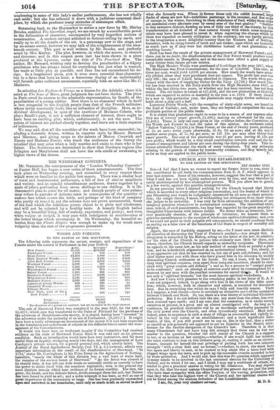THE CHURCH AND THE ESTABLISHMENT.
TO THE EDITOR OF THE SPECTATOR.
22d October 1849.
SIR—I feel that I have no reason to regret my former letter to you, since it has contributed to call forth the communication from E. A. F. which appears in your last number. Some of his remarks, however, suggest the fear that a part of what I said has not been rightly understood even by him, and may therefore be easily misinterpreted by less cleamighted persons. Will you allow me to guard, in a few words, against this possible misapprehension.
In my previous letter I claimed nothing for the Church beyond that liberty i
which s accorded to every other religious communion, and the denial of which to any Dissenting sect would be indignantly denounced by all men as sheer persecu- tion; the simple liberty, I mean, of withholding her ordinances from those whom she judges to be unworthy. I was very far from advocating the addition of any temporal penalties whatsoever to ecclesiastical censures. The theoretical exist- ence, indeed, of such punishments, has long been regarded by the great majority of thoughtful Churchmen with intense dislike. We detest them as invasions, how- ever practically obsolete, of the principle of toleration; we lament them as grievous encumbrances to the exercise of wholesome spiritual discipline; and, even if we could not point to their palpable evil consequences, we should condemn them as resting on a false view of the functions of the State in respect of morality and religion.
Again, the case of hardship supposed by me,—for I must once more disclaim all intention of discussing the Vicar of Preston's conduct,—was simply this. A clergyman is compelled by his Bishop, acting on the letter of the law, to adminis- ter the rites of the Church to persons who evidently care little for them, and whom, therefore, the Church herself regards as unworthy recipients. Thereupon he appeals to the same law, as his only method of escape from so painful a posi- tion, and he is forthwith stigmatized as an ecclesiastical tyrant. Yet, clearly, it is no aggressive act that he has resorted to, but one of /inn sell-defence; and the chief blame must rest with those who have placed him in his dilemma by unduly demanding Church ordinances at his hands. No one, I trust, will be found to deny that spiritual censures, even apart from temporal sanctions, should be exer- cised with "great caution and delicacy"; and as for a process to "compel people to be confirmed, such an attempt at coercion could never be contemplated for a moment by any man with the smallest reverence for sacred this. It would be not only a spiritual bravado," but the most intense spiritual wickedness. And now I turn with pleasure to the remaining points in the letter of E. A. F. I am not prepared, indeed, to go along with him in his views of the tithe ques- tion; which, however, both in character and extent, is unsuited for discussion here. But in everything else which he says I fully and heartily concur. There is, I suppose, a true theory—there is certainly an attractive one—of the connexion between Church and State. So, too, there isa true theory of individual Christian perfection. Bat I do not believe that the one, any more than the other, has ever been realized upon earth; and I am sure that the connexion, as it exists among ourselves at present, is a great and an almost unmitigated evil. As long as it continues, its practical correlative will be an inordinate authority possessed by the civil power over the Church, and often tyrannically exercised. Most men, indeed, seem to acquiesce in such a state of things as necessarily and rightly in- volved in the very notion of an establishment; and a most significant illus- tration of this, if you will permit me to say so, lies in the fact, that a writer so candid as you generally are appeared to see no injustice in the State's inter- ference for the forcible abrogation of the Church's law. Therefore it is that many Churchmen feel and have long felt strongly that there can be but one answer to the question, whether the civil status of the Church is a support to her, or an incubus on her energies,—whether, if she would fulfil her mission, she must continue to lean on this delusive prop, or, casting it aside as an encum- brance, demand for herself the real privilege of putting forth her own inherent strength "with a clear field and no favour,"—whether,in short, she must have free space and liberty to soar, or be content to hop about like a tame bird with clipped wings upon the lawn, and to pick up the miserable crumbs accorded to her by State protection. And I would add, that this was the question which appeared to many minds to be involved in the last contested election for the UniVeraity. of Oxford, and to which I for one, and I think I may say a multitude of others, in- tended to give a practical answer in voting for Mr. Gladstone. You may depend upon it, Sir, that the most zealous Churchmen of the present day are just the men who have least sympathy with the effete Toryism of the waning generation, and that they who take the highest view of the Church and her spiritual claims will not be found among the anxious defenders of the Establishment.
lam, Sir, your very obediert servant, IL D. S.


























 Previous page
Previous page